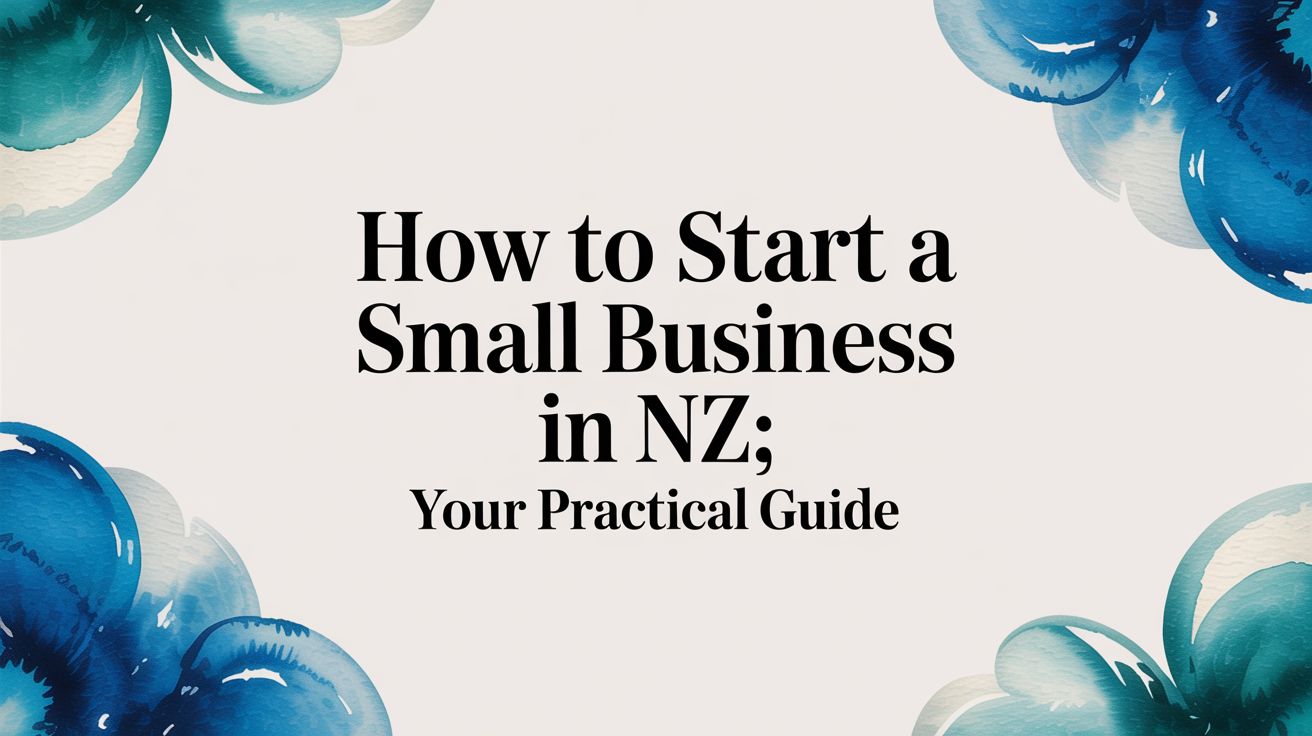
how to start a small business in nz: Your practical guide
Thinking about starting a small business in New Zealand? That often begins with a single, exciting idea. But the real work is turning that spark into something tangible—validating your concept, figuring out the market, and making sure you’re actually solving a problem that Kiwis care about. Getting this groundwork right from the start is what sets a strong business apart from a hobby.
Your Idea to a Viable NZ Business
If you’re wondering how to kick off a small business in NZ, you're in good company. You’re looking to join a crucial part of Aotearoa's economy. Small businesses truly are the backbone of our communities, making up a staggering 97% of all businesses across the country.
As of 2025, there are around 594,000 small businesses here, all contributing hugely to both jobs and our economy. This just goes to show that the Kiwi entrepreneurial spirit is alive and well, but it also means you’ve got plenty of competition. You can dive deeper into the numbers on the impact of small businesses on the New Zealand economy with data from MBIE.
Before you even think about spending a dollar on a fancy logo or a website, the most important thing you can do is take a good, hard look at your business idea. Passion is a great fuel, but it won’t pay the bills. The goal here is to shift from, "I think this is a great idea," to, "I have proof that people will actually pay for this."
Is Your Idea Solving a Real Problem?
Honestly, the most successful businesses are the ones that solve a genuine problem or fill a real need. Ask yourself: what’s the pain point I’m fixing for my customers? Am I saving them time, money, or hassle? Or maybe I'm offering a much better product or a unique experience they can't find anywhere else.
Think about it this way: a meal-kit delivery service isn't just selling food. It’s selling precious time back to busy families who are over the daily grind of grocery shopping and meal prep. A local dog walking service solves a problem for pet owners stuck at the office, worried about their furry mates being cooped up all day. Speaking of which, if you have a passion for pets, getting the business side right is critical, and you might find our insights on starting a pet wellness business helpful.
A great idea is a starting point, but a validated idea is a foundation. Don't fall in love with your concept; fall in love with the problem you're solving for your customers. This mindset shift is the key to building something that lasts.
Identifying Your Target Audience
Here's a hard truth: you can't sell to everyone. Trying to appeal to the entire New Zealand market is a fast track to getting nowhere. Instead, you need to get laser-focused on who your ideal customer is. This means creating a 'customer persona'—a detailed profile of the exact person who is most likely to buy from you.
Get specific and think about these things:
- Demographics: How old are they? Where do they live (e.g., urban Auckland vs. rural Canterbury)? What’s their income and what do they do for a living?
- Psychographics: What do they care about? What are their hobbies, values, and lifestyle choices? What actually drives their buying decisions?
- Pain Points: What are the specific frustrations they face that your business can solve?
Let’s say you’re starting a boutique selling sustainable, NZ-made baby clothes. Your target customer isn't just "new parents." A much better profile would be: "environmentally-conscious millennial parents in Wellington, aged 30-40, with a household income over $100k, who value quality and local craftsmanship more than a cheap price tag." See how much clearer that is? This level of detail makes every decision—from marketing to product design—so much easier.
Sizing Up the Competition
No business exists in a bubble. Getting to know your competitors isn't about copying them; it's about figuring out where you fit in and how you can stand out. Start by listing who else is trying to win over your target audience. They could be direct competitors (offering something very similar) or indirect ones (solving the same problem but in a different way).
Have a look at what they do well and, more importantly, where they’re falling short. Maybe their product is fantastic, but their customer service is a bit rubbish. Or perhaps they've got a great online store but no physical presence for customers who like to touch and feel before they buy. These gaps are your opportunities—your chance to offer something better, different, or more specialised.
Choosing Your Business Structure and Getting Registered
Okay, you've tested your idea and it's got legs. Brilliant. Now it’s time to make things official, and that starts with choosing a legal structure for your business. This isn't just admin for the sake of it—this decision really matters. It dictates how you'll pay tax, how much personal risk you're taking on, and the amount of paperwork you'll be dealing with.
Getting this right from the beginning saves a world of headaches later on. Think of it as laying the proper foundations before you start building your house.
Understanding Your Options
Here in New Zealand, you’ve got three main paths to choose from. Each comes with its own set of pros and cons, making them a better or worse fit depending on what you're planning to do.
- Sole Trader: This is the go-to for most people starting out on their own. It's simple and straightforward. You are the business, meaning there’s no legal separation between your personal and business finances.
- Partnership: Teaming up with one or more people? A partnership is your structure. You and your partners share the profits, the losses, and the decision-making, all laid out in a partnership agreement.
- Limited Liability Company (Company): A company is a separate legal entity from its owners (who are called shareholders). This is a more formal setup that protects your personal assets but also comes with more compliance duties.
This infographic lays out the journey from a simple idea to a validated business concept. You should use the same kind of thinking when picking your structure: start with what you actually need and follow the path that makes the most sense for your specific situation.

Just like the visual shows, every great business starts small and goes through crucial checks. Does it solve a real problem? Will people pay for it? Applying this logic helps you figure out which business structure has the right level of protection and formality for your new venture.
Matching the Structure to Your Business
Let's ground this in some real-world examples.
Say you’re a freelance web developer kicking things off. Going the sole trader route is a no-brainer. It’s dead simple. All the income is yours personally, and tax is easy to manage. The catch? If the business racks up debt, your personal assets—your car, your house—could be on the line. But for a low-risk, one-person service business, it's often the perfect way to start.
Now, imagine two mates launching a food truck. They’ll likely form a partnership. This lets them pool their money, skills, and energy. The critical thing to remember is that they are both personally on the hook for any business debts, even those created by the other partner. A rock-solid partnership agreement isn't just recommended; it's essential.
Finally, picture a couple of founders building a new software app. They’ll almost certainly form a limited liability company. Why? Because it creates a legal wall between their personal finances and the business. If the startup doesn't make it, their personal assets are safe. It’s also the only realistic structure if you plan to seek investment, as you can sell shares to bring on new owners.
To help you weigh the options, here’s a quick comparison of the three main structures.
Comparing NZ Business Structures at a Glance
This table gives you a snapshot, but remember to think about where your business is headed, not just where it is today.
Your choice of business structure isn't set in stone. Many Kiwi businesses start as a sole trader and then transition to a company as they grow, take on more risk, or bring on investors. The key is to pick the structure that fits your needs right now.
If you're keen to get a deeper handle on the nuts and bolts of running a business, our range of practical business courses can give you the confidence you need. It's also worth exploring these [different types of company structures](https://aicofounder.co.uk/blog/different-types of-company-structures) to get a broader view of your options as you grow.
The Registration Process
Once you’ve landed on a structure, you need to get registered. The steps are a bit different for each one.
As a sole trader, you don't actually register with the Companies Office. You can just start trading under your own name. You will need an IRD number for your business activities, and it’s a good idea to get a New Zealand Business Number (NZBN) to make dealing with suppliers and government agencies much smoother.
Setting up a company is a bit more involved:
- Reserve a Company Name: First things first, head to the Companies Office website to check if your dream name is available and reserve it.
- Incorporate the Company: Next, you'll need to provide details like who the directors and shareholders are, and your registered office address.
- Receive Your NZBN: Once your application is approved, your company is officially born and gets its own unique NZBN.
This formal registration gives your business its own legal identity. You’ll need it to open a business bank account, sign contracts, and show customers and suppliers you mean business. Getting this sorted correctly sets a professional tone from day one.
Managing Your Finances and Securing Startup Funding
Let's talk about the lifeblood of any new venture: cash flow. With your business structure sorted, the next make-or-break task is getting a rock-solid handle on your finances. This means digging into your costs, hammering out a realistic budget, and figuring out exactly where the money will come from to get this thing off the ground.

Many Kiwi entrepreneurs start out by bootstrapping—that is, using their own savings to fund the business. It’s the simplest path forward, keeping you in complete control and free from debt. But let's be real, it’s not always an option, especially if your startup costs are on the high side.
Mapping Out Your Startup Costs
Before you even think about funding, you need a painfully clear picture of what it’s going to cost to open your doors. It's so easy to focus on the big-ticket items, but I’ve seen countless businesses tripped up by the small expenses that pile up faster than you can say "budget blowout." A detailed list is non-negotiable.
Here’s a breakdown of the usual suspects:
- One-Off Setup Costs: These are the initial investments you make just once. Think company registration fees, getting a website designed, or buying that crucial bit of kit (like a laptop for a consultant or a coffee machine for a café).
- Fixed Monthly Costs: These are the predictable bills you'll pay every single month, no matter how many sales you make. This includes things like office rent, software subscriptions (think Xero or MYOB), and insurance premiums.
- Variable Costs: These expenses move up and down with your business activity. For a retailer, this is your inventory. For a service provider, it might be petrol for travel or payments to contractors.
Here’s a pro tip: add a 15-20% contingency fund to your final estimate. Trust me, unexpected costs aren't a possibility; they're a certainty. This buffer will give you some much-needed breathing room when they pop up.
Exploring Funding Avenues in New Zealand
Once you've got a solid estimate of your costs, you can start looking at how to fund the dream. In New Zealand, aspiring business owners have a few different paths to consider, each with its own pros and cons.
Beyond personal savings, the first stop for many is friends and family. A loan from someone you trust can be a fantastic leg-up, but it's vital to treat it like a formal business deal. Always, always put the terms in writing to avoid awkward conversations (or worse) down the track.
Other common funding sources include:
- Bank Loans: All the major NZ banks offer business loans, but you’ll need to walk in with a bulletproof business plan and financial forecasts. They need to see you’ve thought through every angle of your venture.
- Government Grants and Support: While straight-up cash grants are incredibly competitive, organisations like Callaghan Innovation offer funding for research and development. It pays to check government business websites for programmes you might qualify for.
- Angel Investors or Venture Capital: If you're building a high-growth startup, angel investors (wealthy individuals) or venture capital firms might be interested. They provide serious capital, but it comes in exchange for an ownership stake (equity) in your company.
No matter who you're pitching to—a bank manager, an investor, or your own uncle—your case must be built on clear numbers and a realistic plan. Passion is infectious, but a well-researched financial forecast is what builds confidence and secures funding.
Essential Financial Housekeeping from Day One
Getting your financial admin sorted from the very beginning will save you a world of pain later. If you remember one thing from this section, make it this: keep your business and personal finances separate.
Opening a dedicated business bank account is absolutely non-negotiable. It creates a clean record of all income and expenses, which makes tax time infinitely less stressful. It also reinforces that professional separation between you and your business, which is critical if you’ve set up a limited liability company.
Choosing a simple accounting system is another key move. Cloud-based software like Xero, MYOB, or Hnry (a godsend for sole traders) helps you track cash flow, fire off invoices, and get ready for tax obligations like GST. Starting with these good habits makes managing your finances less of a chore and more of a powerful tool for making smart business decisions. This organisation is fundamental to learning how to start a small business in NZ successfully.
Right, you've got your business idea and a handle on the finances. Now for the part that often makes new business owners a bit nervous: tax and legal stuff.
Let's be honest, dealing with Inland Revenue (IRD) and other regulations can feel daunting. But getting your head around your obligations from day one is a non-negotiable part of starting a business in NZ. Trust me, sorting this out now will save you a world of pain and potential penalties down the track.
The good news? The system here is actually pretty logical once you get the hang of it. Your very first move is to get an IRD number for your business. Even if you’re a sole trader with a personal IRD number, your business needs its own. This is crucial for keeping your business and personal tax affairs separate. You can apply for one online—it's a quick job.
Getting to Grips with Your Tax Obligations
Once you're registered, a couple of key tax concepts will become part of your world. Tax isn't just an annual headache; it's something you need to manage throughout the year because it directly impacts your cash flow.
The two big ones you'll meet straight away are:
- Provisional Tax: This isn't an extra tax, but simply a way of paying your income tax in instalments throughout the year. If your end-of-year tax bill looks like it will be over $5,000, you’ll need to pay provisional tax. It’s a lifesaver, really—it stops you from getting hit with a massive, unexpected bill when you file your annual return.
- Goods and Services Tax (GST): This is the 15% tax added to most things sold in New Zealand. Here’s the key rule: you must register for GST if your turnover hits (or is likely to hit) $60,000 in any 12-month period. You can also register voluntarily if you're earning less, which can be smart as it lets you claim back the GST you pay on business expenses.
Think about it like this: a freelance consultant kicking off their business and projecting $80,000 in their first year? They'll definitely need to register for GST and will be paying provisional tax. On the flip side, someone starting a small pet-sitting gig on the side, maybe earning $15,000 a year, won't need to worry about GST and won't hit that provisional tax threshold.
My best advice? Treat provisional tax as a savings plan for your tax bill—put the money aside as you earn it. As for GST, remember this: the GST you collect from your customers is never your money. It belongs to the government. Keep it in a separate account so you're not tempted to spend it before your return is due.
Filing Your GST Returns
If you are GST-registered, you’ll be filing regular returns with the IRD. This is where you report the total GST you’ve collected from sales and subtract the total GST you’ve paid on business purchases. The difference is either what you owe the IRD or what they owe you back as a refund.
Most new businesses file every two months, but monthly or six-monthly options are available depending on your situation. For a local café owner, this means keeping a sharp eye on the GST from every single flat white sold and every bag of coffee beans bought. A good accounting software package makes this whole process about a thousand times easier.
Don't Forget ACC Levies
Anyone earning an income in New Zealand, including self-employed folks, pays ACC levies. These levies are your safety net, covering the costs of injuries and providing support if you get hurt and can't work.
When you're self-employed, ACC will send you an invoice directly after you file your first tax return. How much you pay depends on what you earn and the risk level of your industry. For instance, a roofer is at a much higher risk of injury than a graphic designer working from home, so their levies will be significantly higher. It’s essential to factor this into your regular business budget.
Industry-Specific Licences and Compliance
Finally, depending on your line of work, you might need specific licences or certifications to operate legally. This is where compliance gets more specialised.
- A caterer has to follow the Food Act 2014 and register a food control plan.
- A builder doing certain jobs will need to be a Licensed Building Practitioner (LBP).
- A financial advisor must be on the Financial Service Providers Register.
Always double-check with your local council and industry bodies to find out what rules apply to you. A great place to start is the Compliance and Licensing section on Business.govt.nz. Getting these permits sorted before you open for business is fundamental to operating above board and building trust with your customers from day one.
Building Your Brand and Winning Your First Customers

Alright, with the legal and financial groundwork sorted, we get to the exciting part: actually winning your first customers. This is where your business idea stops being a document on your computer and starts breathing in the real world. For a new Kiwi business, this doesn't mean you need a massive marketing budget. It’s all about being smart, practical, and laser-focused.
These days, building that presence almost always starts online. Grabbing hold of digital tools is a massive opportunity for New Zealand's small businesses. In fact, research shows that greater digital uptake could add a staggering NZD 8.6 billion to our GDP by 2025.
Even better, every dollar you put into digital tools can bring back between NZD 2.40 and NZD 3.10 in productivity gains. That makes it one of the smartest investments you can make right from the get-go.
Creating Your Digital Shopfront
Think of your website as your digital home base. It's the one bit of online real estate you truly own and control, which makes it absolutely non-negotiable. It doesn't need to be some complex, award-winning masterpiece, but it must look professional, be simple to get around, and tell people exactly what you do and who you do it for.
It's your 24/7 salesperson. A plumber in Christchurch, for example, just needs a clean site with obvious contact details, a list of services, and a few glowing customer reviews. That's often all it takes to turn a late-night search into a morning phone call.
Your website’s job is to build trust and make it incredibly easy for potential customers to take the next step, whether that’s booking a service, buying a product, or simply getting in touch.
Of course, a great website is useless if no one can find it. This is where search engine optimisation (SEO) comes in. For a local business, this simply means showing up when Kiwis in your area are searching for what you offer. One of the most powerful first moves you can make is setting up a free Google Business Profile. It literally puts your business on Google Maps and into local search results, complete with your hours, address, and reviews.
For more practical advice on this, check out our guide with ten tips for a standout online presence.
Connecting with Your Community on Social Media
Social media is your direct line to building a community and showing the human behind the brand. The trick isn't to be on every platform; it's to be where your ideal customers actually hang out.
- Facebook: Still a beast for connecting with local communities. A Queenstown café can use it to post daily specials and chat with regulars.
- Instagram: A must for any visual business. A potter in Nelson can showcase their beautiful craft, share behind-the-scenes videos, and even drive sales directly.
- LinkedIn: Absolutely essential if you're selling to other businesses (B2B). An IT consultant in Auckland can use it to share valuable industry insights and connect with potential corporate clients.
Remember, the goal isn't just to broadcast; it's to start conversations. Ask questions, share genuinely helpful tips, and always respond to comments. This is how you build relationships and turn casual followers into loyal customers.
Leveraging Content to Build Authority
One of the best ways to attract people is to simply show you know your stuff. Creating and sharing helpful content builds trust and quietly positions you as the go-to expert. This doesn't have to be a huge production.
A landscape gardener, for instance, could write a quick blog post on "Five Frost-Hardy Plants for Waikato Winters." This is super useful for their target customers and proves their expertise. That one article can then be sliced up into a bunch of social media tips or even a short video.
This approach works because you're giving value before you ask for the sale, drawing customers to you naturally. As your business grows, getting found locally becomes even more critical; you can dig deeper into that with these 7 Essential Local SEO Strategies for Small NZ Businesses.
Right, you've made it this far, which means you're serious about getting your business idea off the ground. That's fantastic. But even with the best plans, a few lingering questions always pop up. It's completely normal.
To wrap things up, let's tackle some of the most common queries we hear from aspiring Kiwi entrepreneurs. Think of this as a final, friendly chat to clear up those last few uncertainties.
How Much Does It Cost to Start a Business in New Zealand?
Ah, the classic "how long is a piece of string?" question. The honest answer is that your startup costs could be anything from a few hundred dollars to tens of thousands, and it all boils down to your specific business model.
A freelance writer starting out from their spare room, for example, might only need to cover a domain name and a couple of software subscriptions. On the other hand, someone launching a new cafe in central Wellington is looking at a whole different level of investment—think rent, a full commercial fit-out, expensive kitchen gear, and that first big stock order.
Let's break it down a bit:
- Lean & Service-Based: If you're selling a service, your costs can be refreshingly low. Registering a company name costs next to nothing, typically around $10-$15 NZD. Your main outgoings will likely be for digital tools, website hosting, and maybe some professional indemnity insurance.
- Product or Retail-Based: This is where the costs really ramp up. You've got inventory to buy, potentially a lease bond to pay, shop fit-outs to fund, and specialised equipment to purchase. These ventures will push your startup budget much, much higher.
Do I Need a Business Plan to Start a Small Business in NZ?
Legally? No. You don't need to file a business plan to register your company. But should you have one? Absolutely.
Skipping the business plan is like setting off on a road trip from Auckland to Queenstown with no map, no GPS, and a vague idea that you just need to "head south." You might get somewhere, but it probably won't be where you intended, and you'll waste a lot of time and money along the way.
Your business plan is your strategic roadmap. It forces you to get brutally honest about your target market, your financial projections, your marketing strategy, and how you'll actually run things day-to-day.
It's worth remembering that if you need to borrow money from a bank or get investors on board, a solid business plan is completely non-negotiable. It's the key document you'll use to prove your idea has legs and convince them to put their money behind you.
Can I Start a Business in NZ if I am Not a Resident?
Yes, you absolutely can, but it’s not quite as straightforward. There are a few extra hurdles you'll need to clear. For starters, you'll generally need a New Zealand bank account and a physical NZ address for your company's official registration.
Most importantly, you'll have to play by all the same rules as any local business owner. That means complying with all our local laws and, of course, meeting your tax obligations with the Inland Revenue (IRD).
The process can get a bit tricky, especially around the legal and financial details. This is one area where trying to DIY it is a bad idea. We strongly recommend getting professional advice from an accountant and a lawyer who specialise in this area. They can give you tailored guidance to make sure you tick all the right boxes from day one and avoid any nasty surprises down the track.
Ready to turn your passion into a successful Kiwi venture? Building practical, real-world skills is the best investment you can make. At Prac Skills, we offer a range of career-focused online courses designed specifically for the New Zealand market. Whether you're starting a side hustle, growing a small business, or exploring a new passion, our courses provide the actionable knowledge you need to succeed. Explore our courses today at Prac Skills.
.webp)

